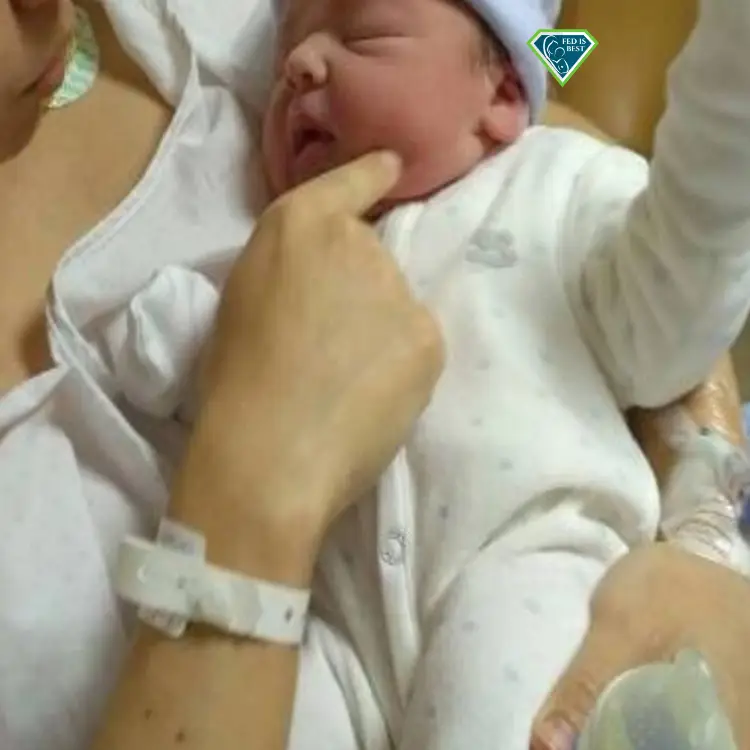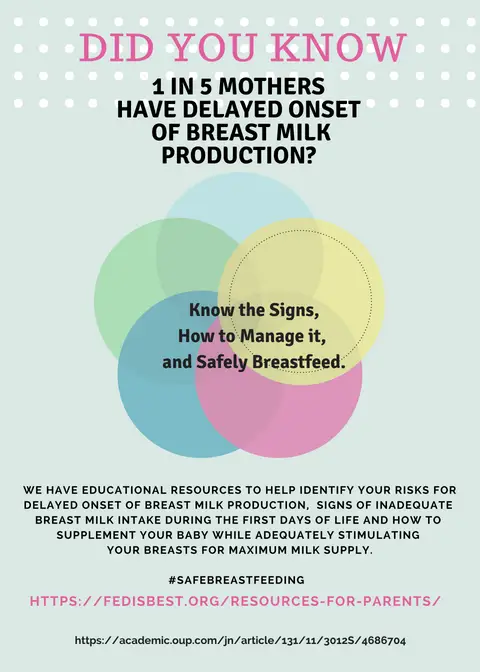By Cassandra M., Fed is BEst Mom and Advocate
When I was pregnant, I was 100 percent sure I wanted to breastfeed my baby. I read countless books and attended a prenatal lactation class to help me prepare for breastfeeding. I learned a lot of things, including that the size of a newborn stomach is no greater than an olive (so untrue), and that colostrum is all they need to eat during their first days.
“Just trust your body.”
Breastfeeding was described as a natural process and all mothers will make enough milk for their baby.
My baby was born by cesarean after 15 hours of an induction for a vaginal delivery. When my baby was born he was much larger than we thought and he weighed 9 pounds 8 ounces! I breastfed him all of the time because the nurses told me he needed extra colostrum from being so large to prevent hypoglycemia.

He loved breastfeeding and would want to nurse all of the time. But then he began to scream frantically if he wasn’t breastfeeding and wouldn’t stop. The nurses checked his glucose level and he had hypoglycemia. They gave me a bottle of formula to feed him right away because hypoglycemia can cause brain damage if not treated immediately. The nurses did an excellent job keeping my baby safe, but I was in shock and confused about why my body wasn’t making enough milk.
Even though I fed him that first bottle, I refused to give him an additional one. It gives me chills every time I remember how I was so brainwashed to ‘trust my body’ and I was allowing my to baby starve. Finally, I accepted I would need to feed him a bit of formula after each breastfeeding session. My husband confessed to me he had a plan to feed him while I was sleeping.

Someone took this picture while I wasn’t looking because I was trying to hide the bottle (the bottle that was saving my baby’s life) from all the pictures.
5 days passed until my milk came in, however, I had to supplement him on and off for two weeks after birth because he demanded so much milk. Why was I not able to exclusively breastfeed my baby from the very beginning? What was wrong with my body? I began to search for answers.
Mothers are taught that it is rare to have insufficient breast milk. But research shows delayed milk production affects at least 1 in 5 women in the first days of an infant’s life, which puts her child at risk of dehydration and underfeeding from exclusive breastfeeding. These complications can result in jaundice, low blood sugar, dehydration and hypernatremia, all threats to the newborn brain. Learn your risks for delayed onset of breast milk supply. Almost all feeding complications can be prevented with close monitoring for signs of hunger and insufficient feeding and supplementation when breast milk is not enough until breast milk supply is sufficient.
Then I discovered the Fed is Best Foundation. I learned science-based education, and I got really angry at all of the wrong information I had been given. I am a proud member of their support group and they help countless mothers safely breastfeed.
Since then, I try to inform mothers about the real truth of delayed onset of milk supply, so no other baby has to go through what my baby and thousands of babies are going through. I personally inform mothers every chance I can, and I have written several letters to hospitals. I warn my friends and use social media to report bad practices. No mothers want to harm their baby as a result of being given false information.
My story ends with a perfectly healthy baby boy, who is now 18 months old. He was exclusively breastfed until he was 6 months old and breastfed until he was 16 months old. You can still successfully breastfeed even though you might have to supplement at the beginning but I was always told you couldn’t.
Please, please, stop just trusting your body and trust your BABY and accurate science-based information instead. Your baby is counting on you to take the best care of them.

HOW YOU CAN SUPPORT FED IS BEST
There are many ways you can support the mission of the Fed is Best Foundation. Please consider contributing in the following ways:
- Join the Fed is Best Volunteer group to help us reach Obstetric Health Providers to advocate for counseling of new mothers on the importance of safe infant feeding.
- Make a donation to the Fed is Best Foundation. We are using funds from donations to cover the cost of our website, our social media ads, our printing and mailing costs to reach health providers and hospitals. We do not accept donations from breast- or formula-feeding companies and 100% of your donations go toward these operational costs. All the work of the Foundation is achieved via the pro bono and volunteer work of its supporters.
- Share the stories and the message of the Fed is Best Foundation through word-of-mouth, by posting on your social media page and by sending our resources to expectant moms that you know. Share the Fed is Best campaign letter with everyone you know.
- Write a letter to your health providers and hospitals about the Fed is Best Foundation. Write them about feeding complications your child may have experienced.
- Print out our letter to obstetric providers and mail them to your local obstetricians, midwives, family practitioners who provide obstetric care and hospitals.
- Write your local elected officials about what is happening to newborn babies in hospitals and ask for legal protection of newborn babies from underfeeding and of mother’s rights to honest informed consent on the risks of insufficient feeding of breastfed babies.
- Send us your stories. Share with us your successes, your struggles and every thing in between. Every story saves another child from experiencing the same and teaches another mom how to safely feed her baby. Every voice contributes to change.
- Send us messages of support. We work every single day to make infant feeding safe and supportive of every mother and child. Your messages of support keep us all going.
Thank you so much from the Founders of the Fed is Best Foundation!

